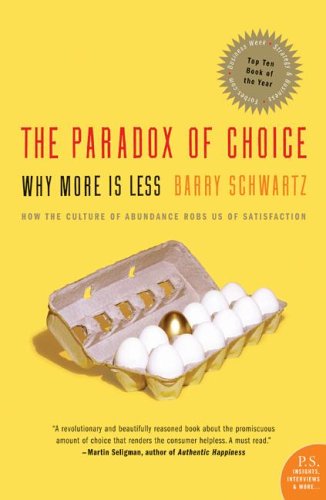The Paradox of Choice - by Barry Schwartz
By Eric Antoine Scuccimarra This is another book I decided to read after seeing a TED talk by the author. The Chicago School of economists, led by Milton Freidman, basically redefined what "freedom" means. The word used to refer to individual freedom to do what you want to do. Friedman et al changed it by equating "freedom" with economic freedom to buy what you want to buy. Friedman did a whole series on this called "Free to Choose." While maybe this made sense during the Cold War, today it has led to the neoliberal philosophy of free trade and unregulated capitalism. Basically, Western civilization is based on the idea that the more choices you have as to what to buy the "freer" you are and the happier you will be. This book analyzes this theory and finds it greatly lacking.
This is another book I decided to read after seeing a TED talk by the author. The Chicago School of economists, led by Milton Freidman, basically redefined what "freedom" means. The word used to refer to individual freedom to do what you want to do. Friedman et al changed it by equating "freedom" with economic freedom to buy what you want to buy. Friedman did a whole series on this called "Free to Choose." While maybe this made sense during the Cold War, today it has led to the neoliberal philosophy of free trade and unregulated capitalism. Basically, Western civilization is based on the idea that the more choices you have as to what to buy the "freer" you are and the happier you will be. This book analyzes this theory and finds it greatly lacking.
One thing I noticed when moving from the USA to Switzerland is that there aren't as many different brands of everything. In the grocery store you might have 5 or so different brands of toothpaste instead of the 100 brands, each with 20 different varietes you would find in the US. At first this was a bit shocking and hard to get used to, but I did get used to it and I have started to appreciate it. I believe the reason for this has to do largely with advertising. There isn't as much of it here, and it's nice to not constantly be bombarded by ads trying to get you to buy stuff you don't need.
Since the major difference between the brands of toothpaste is the brand, rather than the ingredients or the effects or any characteristics of the actual product, less advertising means there is less to differentiate between the brands, and thus fewer brands and fewer products to choose from at the grocery store. Advertising is not really about the product at all - it's about trying to create an image or a feeling in your mind that you associate with the product. Like "chew this gum and you will be rich and famous and attractive to the opposite sex." When you buy the gum and chew it and none of that happens you will likely be disappointed.
The book explains why having more choices is not necessarily a good thing. An example is expectations - in our society we expect that with 200 choices for sneakers we should be able to find the perfect sneaker that will meet our every desire in a sneaker. When the shoe inevitably fails to meet those expectations, we will be disappointed. If we only had 3 choices for sneakers we would know that we had picked the one we like the best and won't be so upset when the sneaker doesn't make us a basketball star. Of course this is a great simplification of the arguments which Schwartz lays out in very well thought through detail.
This was a very interesting book, and I highly recommend it. It was especially interesting to me fromy my vantage point in Switzerland, where I have gained some clarity on how things are in the United States. My brother came here recently and his first complaint was there are too few brands of everything to choose from. When I first got here I was frustrated by the fact that if I wanted to buy any random thing I couldn't go on Amazon and have it delivered the next day, I would have to try to find a bricks and mortar store that might have it and then go there and hope they do, or try to order it from Amazon France or Germany and wait a couple weeks for it to arrive. The thing is - it wasn't that I needed whatever thing it was that I wanted to order, I was just used to having every single thing I ever could want at my immediate disposal. What changed was my expectations, and now, before I go online to try to order something I actually think about whether I really need it and if it is worth ordering.
It never even occurred to my brother that not having 175 options for salad dressing at the grocery store might be a good thing, but Mr Schwartz lays out clearly and with factual backing the reasons why, past a certain point, adding more choices becomes counterproductive.